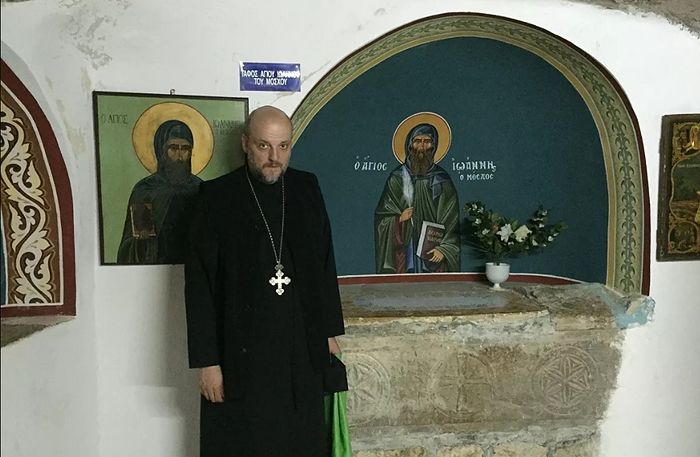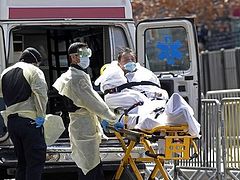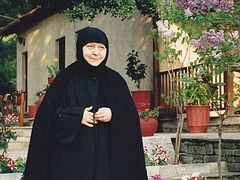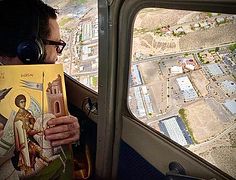In his exclusive interview with the RIA-Novosti Russian news agency, Archpriest Seraphim Gan, the Head of the Chancery of the Synod of Bishops of the Russian Orthodox Church Outside Russia and rector of the Church of St. Seraphim of Sarov in Sea Cliff (New York), has spoken about the celebration of Pascha by ROCOR parishes, the attitude of the faithful to the restrictions imposed in connection with the COVID-19 epidemic and how quarantine measures can be assessed in different Local Churches.
—Fr. Seraphim, how was Pascha celebrated in parishes of the Russian Church Outside Russia? Were most services held without parishioners or with their participation, though in small groups?
—The services of Holy Week and Pascha were celebrated in silence. In most parishes they were conducted in the presence of a limited number of worshippers, who participated by singing in the choir or helping in the altar. As far as I know, all the monasteries and convents were closed for pilgrims.
In one parish where there is a spacious parking lot the parishioners, while sitting in their cars or standing by them, observed the midnight cross procession and happily met the beginning of the Brightness of Matins, responding with, “In Truth He Is Risen!” to their priest’s greetings.
In my parish we had no procession so as not to attract the neighbors’ attention. We the clergy came out to the church porch, and the choir closed the doors behind us, so we started serving the Matins quietly. Proclaiming Paschal verses in the porch, I saw some people whom I believed to be outsiders; they were standing not on the church land but in the street and following our service. Taking a good look at their faces, I recognized my parishioners and greeted them. After the end of the solemn service the parishioners who had participated in it from a distance drove up on their cars and in groups came into the church for Communion.
—How did the clergy and laity react to such a measure by the authorities as the closure of churches for parishioners on Pascha?
—An overwhelming majority of clergy and parishioners easily submitted to the restrictive measures of local authorities and the directions of their ruling hierarchs. Of course, we can’t say that nobody was worried because of this. The fact is that the Holy Week services, which are touching and rich in content, and the victorious and joyous Paschal services, all the traditions and customs around these holy and great days—all of this holds a special place not only in the life of the Russian Church but also in the hearts of our people.
A noteworthy fact: at Great Vespers on Pascha we read the Gospel lesson that tells how the Savior came through the locked doors into the house, where the apostles had been hiding after the final days of His life on earth. Judging by the feedback of the laypeople who had participated in the Holy Week and Paschal services online thanks to church live-streaming services, despite the closed doors of churches, God came to them and visited them by the consolation and joy of home prayer with their families.
Thus, as a result of this unique experience of “Pascha in quarantine”, I have arrived at the conclusion that if someone not only believes in God but also trusts Him, he won’t be left without His blessing in these days, regardless of the circumstances.
—Were there any places where the authorities even banned the celebration of services by priests? And what did the clergy do in such a situation?
—I can’t think of any such cases. As far as I know, the celebration of services was not prohibited anywhere. In a large parish of Australia (where churches are closed for public worship for half a year) the rector and the parish council members appealed to the local authorities, requesting them to allow a few more worshippers than permitted to take part in the Paschal services; and they showed understanding.
—Was mutual understanding with the authorities attained everywhere? Were there any nasty incidents?
—We were informed about some clerics and parishioners about whom were their neighbors complained. Later police came to them to find out what had happened. In most cases, it turned out that there had been no violations on their part—it was their neighbors who were panicky by suspecting them of opposition to the measures. But there were some instances when the authorities had to explain to parish officials the specifics of the local regulations and warn them that in case of disobedience they might be fined. But there were few such incidents.
—Can you compare the quarantine regulations taken in different Local Churches? Which of them is closest to yours? How has world Orthodoxy responded to the challenge of COVID-19 in general—promptly or tardily?
—In some Churches, all the parishes were closed and all services stopped, while other Churches continued to celebrate services in all parishes, ignoring the instructions of the authorities. I dare not and indeed have no right to comment on these decisions. The ruling hierarchy of these Churches sees the situation in the countries where they serve better than someone living in New York City.
But in the present situation, I think it is necessary to find a golden mean, a reasonable and peaceful approach to the problem, observe the precautions taken by the authorities, and at the same time not abandon the flock without spiritual care, prayer and Church life. This seems to be precisely the approach that guided our Church hierarchy to deal with the issue.
Many in ROCOR understand that the closure of churches for public worship cannot be compared with the periods of anti-Christian persecution. Today no one is forcing us to renounce our faith and no one is forbidding us to serve. We realize that the new coronavirus has been allowed by God. Therefore, we should arm ourselves with patience and try to learn a lesson from this difficult situation.
Has world Orthodoxy made some particular mistakes concerning the coronavirus infection? Perhaps it has. But mistakes have also been made at the level of state agencies of various countries, public organizations, health care services and so on. In fact, we are all human beings, and the Church consists of human beings, too.
Perhaps God allows us to err so that we can learn, perfect ourselves, take care to fulfil all our duties and obligations and should not think ourselves superior. And, most importantly, we should repent of our errors, learn from them and try to improve.
We should always bear in mind that we will never find complete and full well being on this earth. We will only find it in the Church Triumphant—that is, in the Heavenly Kingdom.
—On Bright Tuesday Archpriest Alexander Ageikin became the first cleric of the Moscow Patriarchate to die of the effects of coronavirus disease. Have there been any fatalities from coronavirus in ROCOR? Do you have any data about how many of your clergy have caught the virus to date and what their current condition is?
—Along with many other members of ROCOR, I am still very shocked by this sad news. Fr. Alexander and I first met in Moscow twenty years ago, long before the restoration of the unity between the Patriarchate and ROCOR. He came to us many times, visiting our churches and monasteries in the USA and Europe. His moving meeting with Metropolitan Laurus of blessed memory late in 2007 at the Holy Trinity Monastery in Jordanville (New York) was particularly memorable. I was privileged to be present at that talk, and Fr. Alexander used to recall it. I believe he will be vouchsafed God’s mercy in the world to come.
We, the ROCOR clergy and parishioners who knew Fr. Alexander closely, will keep him in our prayers with love and gratitude, and do all in our power to support his family in this difficult time.
Unfortunately, several clergymen of our Church have caught this virus as well; one of them, Deacon Alexander Gusev1 from the Western American Diocese, passed away on Sunday April 5. Judging by the information to date, the other clergy are recovering, thank God.
—What can you wish our readers on this Pascha?
—Not to lose heart, and, guided by the truth of the Radiant Resurrection of Christ, continue their path in life with hope. Trials are important in our lives too—they educate us, bring us closer to God and to each other. If we look at them from this perspective, we will certainly remain calm, learn something and enrich ourselves spiritually. May God grant us to overcome this trial and its consequences as swiftly as possible so that we can come out of it stronger!





